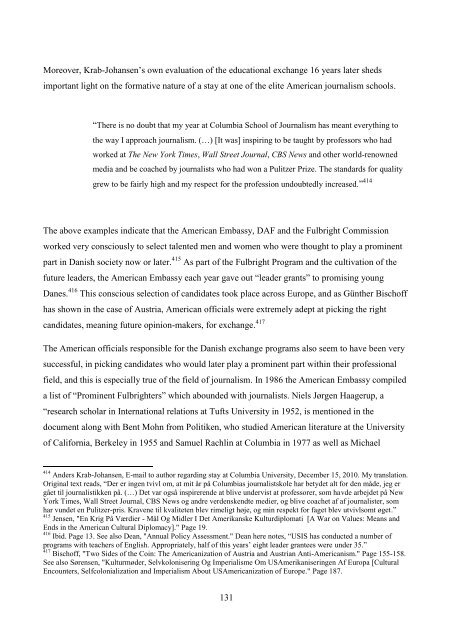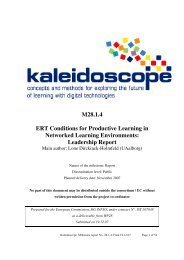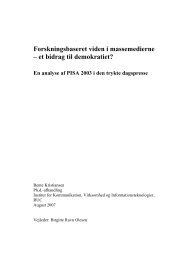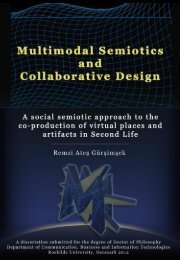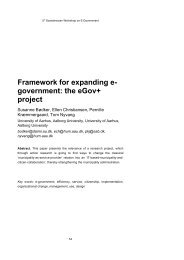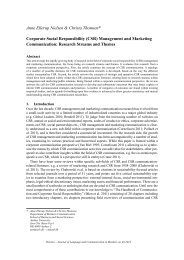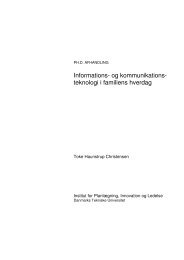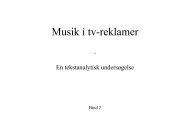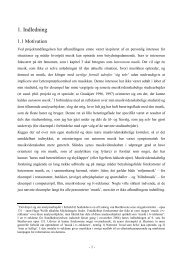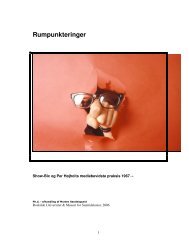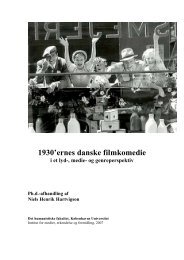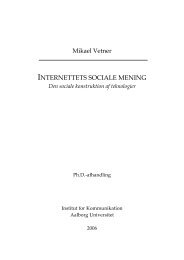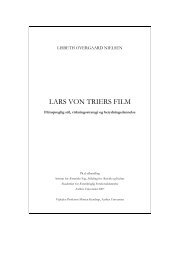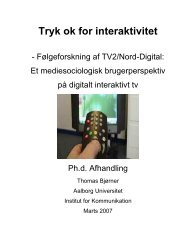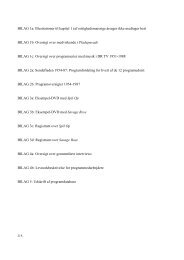The Jeremiad Over Journalism
The Jeremiad Over Journalism
The Jeremiad Over Journalism
Create successful ePaper yourself
Turn your PDF publications into a flip-book with our unique Google optimized e-Paper software.
Moreover, Krab-Johansen‘s own evaluation of the educational exchange 16 years later sheds<br />
important light on the formative nature of a stay at one of the elite American journalism schools.<br />
―<strong>The</strong>re is no doubt that my year at Columbia School of <strong>Journalism</strong> has meant everything to<br />
the way I approach journalism. (…) [It was] inspiring to be taught by professors who had<br />
worked at <strong>The</strong> New York Times, Wall Street Journal, CBS News and other world-renowned<br />
media and be coached by journalists who had won a Pulitzer Prize. <strong>The</strong> standards for quality<br />
grew to be fairly high and my respect for the profession undoubtedly increased.‖ 414<br />
<strong>The</strong> above examples indicate that the American Embassy, DAF and the Fulbright Commission<br />
worked very consciously to select talented men and women who were thought to play a prominent<br />
part in Danish society now or later. 415 As part of the Fulbright Program and the cultivation of the<br />
future leaders, the American Embassy each year gave out ―leader grants‖ to promising young<br />
Danes. 416 This conscious selection of candidates took place across Europe, and as Günther Bischoff<br />
has shown in the case of Austria, American officials were extremely adept at picking the right<br />
candidates, meaning future opinion-makers, for exchange. 417<br />
<strong>The</strong> American officials responsible for the Danish exchange programs also seem to have been very<br />
successful, in picking candidates who would later play a prominent part within their professional<br />
field, and this is especially true of the field of journalism. In 1986 the American Embassy compiled<br />
a list of ―Prominent Fulbrighters‖ which abounded with journalists. Niels Jørgen Haagerup, a<br />
―research scholar in International relations at Tufts University in 1952, is mentioned in the<br />
document along with Bent Mohn from Politiken, who studied American literature at the University<br />
of California, Berkeley in 1955 and Samuel Rachlin at Columbia in 1977 as well as Michael<br />
414 Anders Krab-Johansen, E-mail to author regarding stay at Columbia University, December 15, 2010. My translation.<br />
Original text reads, ―Der er ingen tvivl om, at mit år på Columbias journalistskole har betydet alt for den måde, jeg er<br />
gået til journalistikken på. (…) Det var også inspirerende at blive undervist at professorer, som havde arbejdet på New<br />
York Times, Wall Street Journal, CBS News og andre verdenskendte medier, og blive coachet af af journalister, som<br />
har vundet en Pulitzer-pris. Kravene til kvaliteten blev rimeligt høje, og min respekt for faget blev utvivlsomt øget.‖<br />
415 Jensen, "En Krig På Værdier - Mål Og Midler I Det Amerikanske Kulturdiplomati [A War on Values: Means and<br />
Ends in the American Cultural Diplomacy]." Page 19.<br />
416 Ibid. Page 13. See also Dean, "Annual Policy Assessment." Dean here notes, ―USIS has conducted a number of<br />
programs with teachers of English. Appropriately, half of this years‘ eight leader grantees were under 35.‖<br />
417 Bischoff, "Two Sides of the Coin: <strong>The</strong> Americanization of Austria and Austrian Anti-Americanism." Page 155-158.<br />
See also Sørensen, "Kulturmøder, Selvkolonisering Og Imperialisme Om USAmerikaniseringen Af Europa [Cultural<br />
Encounters, Selfcolonialization and Imperialism About USAmericanization of Europe." Page 187.<br />
131


